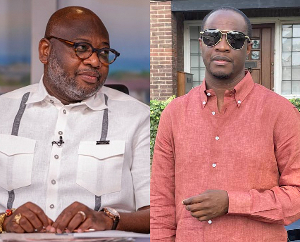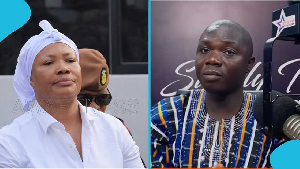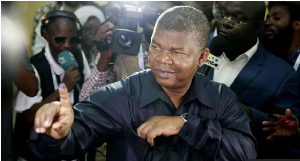“. . . it was important for us as a righteous party, a party which defends virtue to take a moral high ground.” Jerry John Rawlings
Ever since he was compelled by constitutional means to vacate the presidency of Ghana, Jerry John Rawlings has taken it upon himself to mount the moral platform to judge governments and personally attack the two presidents who succeeded him. He has consistently attacked the NPP administration of John Agyekum Kufuor as a band of thieves and Kufuor as the “thief-in-chief.” Despite the fact that the party in power is his own party which he is the founder, he has not relented in rallying against the style of John Atta Mills, the current president. We dare to ask why Mr. Rawlings is so self-righteous.
While we do not pretend to know Mr. Rawlings’ intent, it is obvious that his premise is essentially his initial claims of probity and accountability. Sadly and ironically, there is no time in the history of Ghana when arrogance described his government’s attitude toward probity and accountability. While Rawlings fed Ghanaians with lies of arrogance on the part of the NPP administration, he capped his own arrogance with his now notorious statement “moka koraa na meye no more,” (the more you say the more I do). Essentially, Rawlings admitted to his failures but was not ready to acquiesce to calls from Ghanaians to listen to their viewpoints. He knew of the problems of corruption but did nothing to correct the situation, because he was personally involved. The incidence of Jerry John Rawlings on the Ghanaian political landscape started with his failed attempt to lead a mutiny on June 4, 1979. In his responses to charges leveled against him by the then military administration led by late General F. W. K. Akuffo of SMC II, he brazenly admitted to leading the mutiny and was ready to accept any verdict. Fortune smiled on him and was removed from jail by yet another mutiny led by Major (or Osahene?) Boakye Djan who is now a mortal enemy of the Rawlings. For his role on June 4, Rawlings was made the head of the new military junta that became known as the Armed Forces Revolutionary Council (AFRC).
What ensued is now history but would continue to haunt Ghanaian politics. For the first time in the political history of Ghana ex-heads of state, all military, together with other military officers who held high office in the governments were executed by firing squad. Ghana was in a revolution and Ghanaian youths embraced it hoping it was the change they were expecting that was upon them. True to the promise of the leaders of the AFRC, particularly, Maj. Boakye Djan, the junta would hand over power to a civilian administration within a few months. A new elected government of the Peoples National Party, led by Hilla Liman, was inaugurated in September of 1979. Within 27 months of the new administration, a military coup d’état led by Jerry Rawlings on a trumped up charge of corruption and lack of probity and accountability. A new government, Peoples National Defence Council (PNDC) was formed with Rawlings as chairman and head of state.
For close to two decades a government of repression and dictatorship was imposed on Ghanaians. Governance was modeled on the Green Book of Libya’s Muammar Gaddafi. Workers committees were organized at workplaces, regions and districts. These arrangements of governance at the macro levels were supposed to bring government to the people. Arguably, this was the first time such people-based government was introduced in Ghana. What was supposed to increase participatory government took an unexpected turn. State terrorism was unleashed on the country and citizens perceived to be anti-revolutionary were either made to disappear or tried and jailed by kangaroo courts called tribunals. As we speak, several Ghanaian citizens who were picked up from their homes in the thick of night have as yet not been accounted for.
For the 20 years of his administration, Mr. Rawlings would not let off the constancy of his vituperations against the past government he had overthrown. In the meantime, the country’s economy stayed in a freefall and the effects of the plunge together with repression continued to negatively increase the government’s popularity. Like all military governments, the people’s feelings did not matter much to the government.
One of the reasons Rawlings would cite for his intervention was the previous administration’s decision to devalue the cedi. In 1983 the PNDC invited the Bretton Woods institutions of the World Bank and the International Monetary Fund (IMF) into the country. Ghana would devalue its currency by 900 percent and denationalization of state industries was recommended. In the process, unemployment increased exponentially. The hardships would never abate and dissent increased, especially as political activity was restricted only to the ruling classes.
But what are most telling were the blatant corruption and the arrogance of the government. When it was reported in the Ghanaian media that Mrs. Rawlings had installed a Jacuzzi in their home, the response of the government was to dismiss the accusation cursorily. Here is a government that had described those who had more than two water closets in their homes as criminals. This is a government that had executed Rear Admiral Amedume and Air Force Captain Yaw Boakye for taking bank loans. Many more who were less prominent would be executed or imprisoned for no reason at all.
In the wake of a denationalization exercise in the late 1980s and early 1990s, several Ghanaian industries were sold off without any accounting as to where the moneys accrued went. In fact, when in 2001 the famous account 48 it was non-existent. But here is the destination to which moneys made from property seized from perceived opponents of the PNDC went. In the name of the 31st Women’s organization, Mrs. Konadu Agyeman Rawlings acquired some of the factories that were put in divestiture by her husband’s government but would not pay up, even though she obtained an overseas loan guaranteed by her husband’s government. And here is a government that claimed to be dedicated to probity and accountability. Together with its leader the PNDC and later the NDC governments bilked Ghanaians of several millions of dollars and sterling. And they did it with arrogance and violence.
Evidence abounds that the Tema Cement Factory was sold off to Scancem company from Norway that bribed senior government officials including Rawlings and his chief minister P. V. Obeng. Mr. Obeng has admitted receiving several millions of money from the company. Rawlings on the other hand strongly denies but he dodged journalists who sought him out for interview on the issue. He claims that it is his friends who pay his children’s fees in England and Ireland but the company that paid the fees for his children has now been identified. Rawlings has indicated that he now has lawyers who are ready to clear his good name in Norwegian courts. That day in court will be the day, as John Wayne would say. Jerry Rawlings owes everything he possesses to Ghana. He took away 16 vehicles and three houses on his exit from the presidency. He now has a number of luxury houses in Ghana and abroad and his children are educated in some of the finest universities in Europe. The man tools around in a fleet of high end cars all at the expense of the Ghanaian tax payer. A recent report on Ghanaweb indicated that the access road to one of his mansions in an Accra suburb is the only one tarred in the community. At the moment he is the only former president in Ghana who is paid his ex-gratia and enjoys all the trappings that go with the office. He killed Acheampong, Afrifa and Akuffo and left Hilla Liman to die in penury while he rode around on Harley Davidsons.
This is the man who calls former President Kufuor a thief and property grabber and claims to be the champion of the ordinary Ghanaian.
Wherein lies Rawlings’ claims of probity, integrity and accountability when as we speak, the world has just been told of ministers in his administration, some of who are still serving in the current NDC administration of John Atta Mills, who have been cited in a case of bribery by a British court? Wherein lies the truth in this man’s assertions of self-righteousness when his own credibility is on the line for making a British company pay his children’s school fees? These are questions for Ghanaians and the world to evaluate a man who killed and maimed Ghanaians for close to twenty years largely because they opposed him, took bank loans and had more than fifty thousand cedis in the bank. This is Rawlings, folks, the man of integrity. The man is hypocrisy personified.
Ogyam Kwabena
Opinions of Monday, 12 October 2009
Columnist: Ogyam Kwabena
Saint John Rawlings Of Ghana
Opinions













